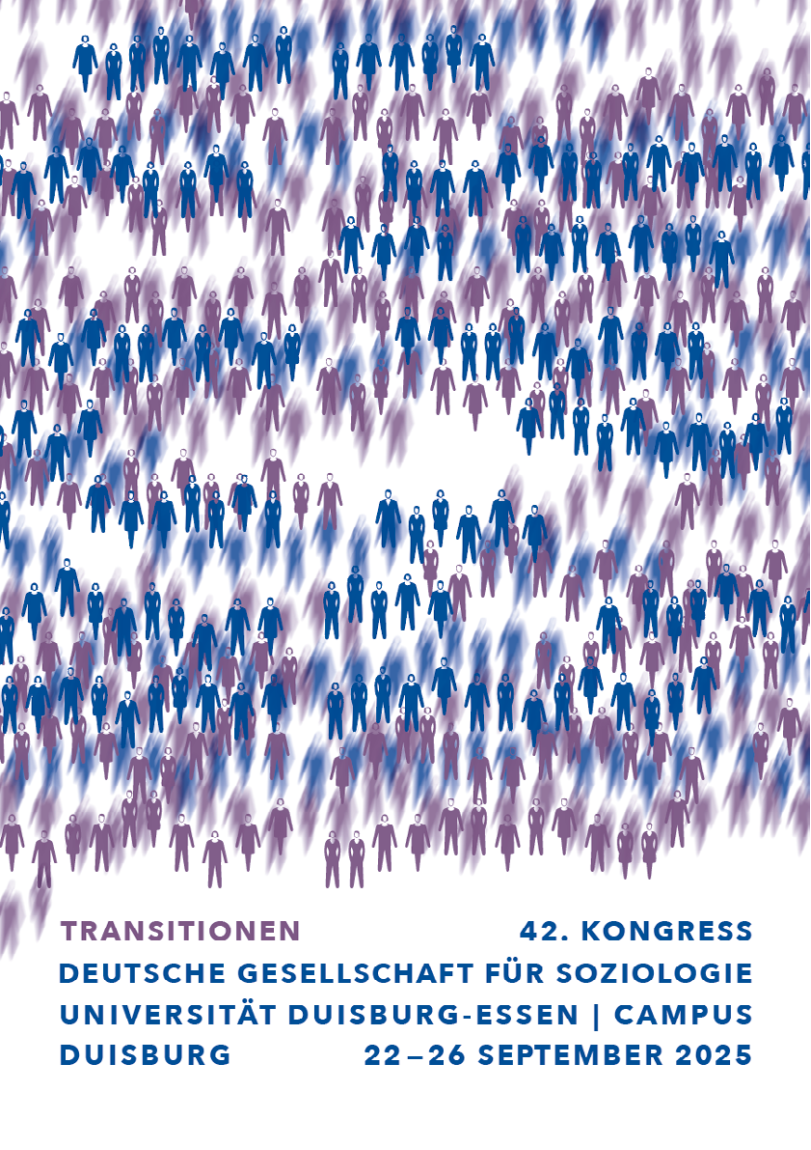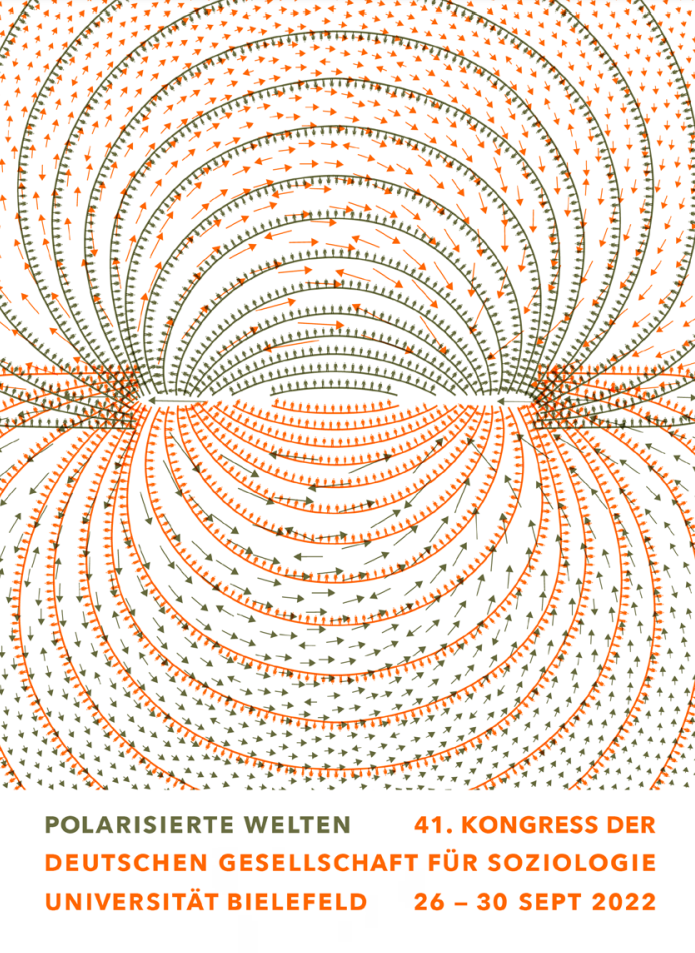Publikationen
-
Transitionen. Verhandlungen des 42. Kongresses der Deutschen Gesellschaft für Soziologie in Duisburg 2025
Der 42. Kongress der Deutschen Gesellschaft für Soziologie 2025 mit dem Titel "Transitionen" fand vom 22.-26. September 2025 an der Universität Duisburg-Essen (Campus Duisburg) statt. An dieser Stelle finden Sie alle von den Vortragenden eingereichten Beiträge.
Zitiervorschlag:
Monika Wohlrab-Sahr (Hg.) 2026: Transitionen. Verhandlungen des 42. Kongresses der Deutschen Gesellschaft für Soziologie in Duisburg 2025 -
Polarisierte Welten. Verhandlungen des 41. Kongresses der Deutschen Gesellschaft für Soziologie in Bielefeld 2022
Der 41. Kongress der Deutschen Gesellschaft für Soziologie 2022 mit dem Titel "Polarisierte Welten" fand vom 26.-30. September 2022 an der Universität Bielefeld statt. An dieser Stelle finden Sie alle von den Vortragenden eingereichten Beiträge.
Zitiervorschlag:
Paula-Irene Villa (Hg.) 2023: Polarisierte Welten. Verhandlungen des 41. Kongresses der Deutschen Gesellschaft für Soziologie in Bielefeld 2022 -
Soziologie - Forum der Deutschen Gesellschaft für Soziologie
Soziologie - Forum der Deutschen Gesellschaft für Soziologie
Die Zeitschrift Soziologie erscheint viermal im Jahr zu Beginn eines Quartals. Redaktionsschluss ist jeweils sechs Wochen vorher. Für Mitglieder der DGS ist der Bezug der Zeitschrift im Mitgliedsbeitrag enthalten. Beiträge in der Soziologie werden erfasst in CSA Sociological Abstracts (San Diego) und SOLIS (Bonn).
Die digitale Version wird mit freundlicher Genehmigung der CAMPUS-Verlags GmbH, 18 Monate nach Erscheinung der Printausgabe, an dieser Stelle veröffentlicht.
-
Gesellschaft unter Spannung. Verhandlungen des 40. Kongresses der Deutschen Gesellschaft für Soziologie 2020
Der 40. Kongress der Deutschen Gesellschaft für Soziologie 2020 mit dem Titel "Gesellschaft unter Spannung" fand vom 14.-24. September 2020 aufgrund der Pandemie in digitaler Form statt. An dieser Stelle finden Sie alle von den Vortragenden eingereichten Beiträge.
Zitiervorschlag:
Birgit Blättel-Mink (Hg.) 2021: Gesellschaft unter Spannung. Verhandlungen des 40. Kongresses der Deutschen Gesellschaft für Soziologie 2020 -
Komplexe Dynamiken globaler und lokaler Entwicklungen. Verhandlungen des 39. Kongresses der Deutschen Gesellschaft für Soziologie in Göttingen 2018
Der 39. Kongress der Deutschen Gesellschaft für Soziologie 2018 mit dem Titel "Komplexe Dynamiken globaler und lokaler Entwicklungen" fand vom 24.-28. September 2018 an der Georg-August-Universität Göttingen statt. An dieser Stelle finden Sie alle von den Vortragenden eingereichten Beiträge.
Zitiervorschlag:
Nicole Burzan (Hg.) 2019: Komplexe Dynamiken globaler und lokaler Entwicklungen. Verhandlungen des 39. Kongresses der Deutschen Gesellschaft für Soziologie in Göttingen 2018Erscheinungsdatum: 30. September 2019
-
Geschlossene Gesellschaften - 38. Kongress der Deutschen Gesellschaft für Soziologie
Der 38. Kongress der Deutschen Gesellschaft für Soziologie 2016 mit dem Titel "Geschlossene Gesellschaften" fand vom 26.-30. September 2016 an der Universität Bamberg statt. An dieser Stelle finden Sie alle von den Vortragenden eingereichten Beiträge.
Zitiervorschlag:
Stephan Lessenich (Hg.) 2017: Geschlossene Gesellschaften. Verhandlungen des 38. Kongresses der Deutschen Gesellschaft für Soziologie in Bamberg 2016.Erscheinungsdatum: 30. September 2017
-
Routinen der Krise - Krise der Routinen - 37. Kongress der Deutschen Gesellschaft für Soziologie
Der 37. Kongress der Deutschen Gesellschaft für Soziologie 2014 mit dem Titel "Routinen der Krise - Krise der Routinen" fand vom 1.-10. Oktober 2014 an der Universität Trier statt. An dieser Stelle finden Sie alle von den Vortragenden eingereichten Beiträge.
Zitiervorschlag:
Stephan Lessenich (Hg.) 2015: Routinen der Krise - Krise der Routinen. Verhandlungen des 37. Kongresses der Deutschen Gesellschaft für Soziologie in Trier 2014.








